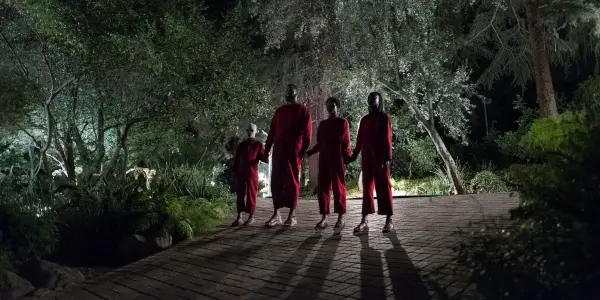Spoilers ahead.
Jordan Peele‘s Us follows Adelaide (Lupita Nyong’o), from a mysterious and traumatic event as a child to her return there as an adult. In the hall of mirrors of a Santa Cruz funhouse, she encounters her exact double. The fear of what she saw that night has stuck with her, but now she isn’t a young girl, wandering off alone, but a grown woman, married with two children, driving down to their luxurious beach house for the summer.
For many, this is the epitome of success – the nuclear family, comfortable, privileged. Gabe (Winston Duke) has his boat, Zora (Shahadi Wright Joseph) has her cellphone, and Jason (Evan Alex) has his toys. This isn’t their first trip to their summer home, it’s become routine. These comforts are all put to one side once their home is invaded, and they come face-to-face with their doppelgängers.

Their casual wear is replaced by red identical overalls, as if they are escaped inmates or maintenance workers; Jason’s plastic horror mask is a replaced by burn scars on his double’s face; the c-section through which Zora was born was one self-inflicted by Red, Adelaide’s double. They look the same, but they’ve suffered far worse fates.
The Sins of Others
Before the family break in, Adelaide immediately calls the police, much to her husband’s bewilderment. And before this twisted reflection even appears in their driveway, she knows that it’s coming; there is a debt unpaid. But by time we discover that these ‘tethered’ individuals were (at least, supposedly) part of a government experiment to control their counterparts, left to rot in an underground prison, many moviegoers will still be asking the question:
Why are these people being punished for something they had no knowledge of? Why are they to blame for the sins of others?
This is also a question asked by people in real life every day, when they’re confronted with inequality and the fact of their own privilege. When told to ‘check your privilege,’ it’s easy to say ‘it’s not my fault I was born into this,’ or ‘why should I be criticised for something I didn’t choose?’
With Us, this question is ultimately irrelevant. Red believes that the government created the Tethered, but she doesn’t know this for sure, or have anything but theories on their motives. An untouchable, unaccountable system is behind the injustice of their time spent trapped in subterranean tunnels, but complicity doesn’t require active participation.
The next, and perhaps more important question becomes: why didn’t we know about this until now? And what are we going to do about it now that we do?
Complicity and privilege
“Gabe is just, to me, the epitome of privilege,” Winston Duke told Complex of his character. “What I hope people take away [from the film] is a questioning of how they themselves participate in cultures of privilege.”
Duke‘s character Gabe is completely unaware that, for all these comforts, he is benefiting from the subjugation of someone just like him. The difference between the gentle and corny father and his brutish doppelgänger is stark, but the only reason for their otherness is the environment they were nurtured in. There is nothing inherently wrong with the way he covets wealth and gleefully shows off his boat to the family – but these privileges affect others, even if they are out of sight, out of mind. With every step he took, his Tethered double took another step in a space far less accommodating.
While all of the family are confronted by the living embodiment of this fact, now out in the open rather than tucked away underground, Adelaide’s experience is a little different. While memories of her first meeting with Red are obscured by trauma, she is revealed at the film’s climax to have been one of the Tethered, escaping to replace the real Adelaide when she was just a little girl.
Rather than just a gotcha twist ending, this development positions the Adelaide who has grown up on the surface world as someone who has transitioned from a life of turmoil to one of privilege. She did what she could to get there, and deserves the light of day as much as anyone else. Yet her refusal to face the situation she’d left behind or help those still suffering shows how we can turn our backs on those less fortunate than us, when we find success and stability, allowing history to repeat itself unimpeded.
What Adelaide and her family receive at the expense of others is the result of a system they didn’t create, but examining that relationship is necessary. After all, these aren’t people completely separate from us, they are us. By allowing them to be harmed, we’re ultimately harming ourselves.
What lessons do you think we can learn from Us?
Does content like this matter to you?
Become a Member and support film journalism. Unlock access to all of Film Inquiry`s great articles. Join a community of like-minded readers who are passionate about cinema - get access to our private members Network, give back to independent filmmakers, and more.